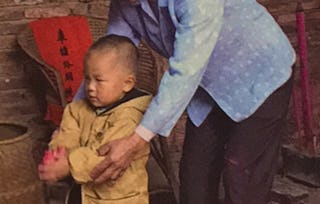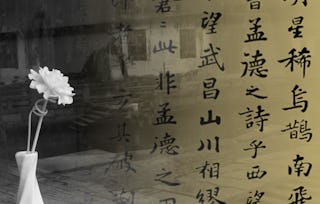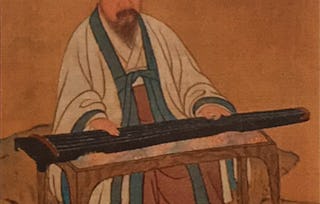This course of Chinese Culture and Contemporary China will explore the foundations of Chinese civilization and the dimensions of Chinese culture. It will pay particular attention to the relationship between Chinese culture and the present-day life of the Chinese people and to the different elements of the culture which are under the present social structures, belief systems, literature, arts, customs, etc. The course aims at providing students with a deeper knowledge of Chinese culture, thus enabling them to better understand China.

Chinese Culture and Contemporary China
Ends soon: Gain next-level skills with Coursera Plus for $199 (regularly $399). Save now.

(528 reviews)
Skills you'll gain
Details to know

Add to your LinkedIn profile
17 assignments
See how employees at top companies are mastering in-demand skills

There are 6 modules in this course
Confucian culture is the cornerstone of traditional Chinese culture. In this segment, we introduce the three basic concepts of Confucian culture: Li or ritual etiquette, Ren or benevolence, and Tao. In the Confucian view, the variety of practiced rituals maintains the balance of society. Benevolence is the core of the ritual because only with benevolence one can truly observe li. Tao is the natural laws or order of the universe. One has to research the objective universe genuinely, to find those natural laws, and then use what was found to structure the human world. All these elements make the benevolence great.
What's included
3 videos3 assignments2 discussion prompts
In this unit, we introduce the world of Chinese painting, which is one of the oldest continuous artistic traditions in the world. We discuss three important features that make Chinese art of painting unique and different from the Western painting. We also analyze the possible philosophical reasons lying behind that difference. By the end of the unit, one will know things like why Chinese paintings are usually not framed and without many colors, or why Chinese people when drawing might prefer having more than one artistic perspective, as well as other aspects of Chinese art.
What's included
3 videos3 assignments2 discussion prompts
This unit mainly focuses on three topics of Chinese music culture which are the origin and essence of the Chinese musical style, Confucian effect on the understanding of traditional Chinese music and Contemporary Chinese music development under the influence of western music. It is hoped that after completing this unit, students could feel and realize the uniqueness of Chinese traditional music, and have an overall understanding of the development of Chinese music culture.
What's included
3 videos3 assignments1 discussion prompt
With a large variety of clothes and accessories, from the dragon robe of emperor to the humble clothes of common people, Chinese traditional costumes show the beauty of the material world. It’s also related to the social classes, feudal ethics and traditional philosophies. This unit centers on three major questions, trying to show specific details of the splendid costumes as well as explaining the cultural implication, such as the ranks of imperial court, the customs of weddings and funerals, the gender issue in Tang dynasty, etc.
What's included
3 videos3 assignments1 discussion prompt
Chinese food is well-known throughout the world for its appearance, aroma and flavor. The uniqueness of Chinese food lies not only in its appearance and flavor, but also in its style of preparation, cooking and presentation. Chinese food culture was gradually formed in the development of Chinese society and civilization and was in turn helped shape the character and temperament of the Chinese people. As a panorama of Chinese culture, Chinese food is generally believed to be one of the best channels to know this country, its people and culture. There is a profound philosophy under Chinese food culture, and this lesson will help the learners understand why eating and drinking is of special importance to the Chinese, not only to their physical wellbeing but also to their mental health and harmony.
What's included
5 videos2 assignments1 discussion prompt
Festivals are an important part of Chinese culture. A significant number of festivals in folklore are rich in various elements of Chinese traditional culture. Do you know what the most important Chinese holiday is? Do you know what Chinese people eat, what clothes they wear and what other interesting things they do during those holidays? More important do you know the reason why they are doing that? Watch the "Festival Culture" unit to find that out. The unit is rich in contents supplied with exciting media that brings you to the amazing world of Chinese festivals.
What's included
4 videos3 assignments1 discussion prompt
Instructors



Offered by
Explore more from History
 Status: Preview
Status: PreviewThe Chinese University of Hong Kong
 Status: Preview
Status: PreviewThe Chinese University of Hong Kong
 Status: Preview
Status: PreviewThe Chinese University of Hong Kong
 Status: Preview
Status: PreviewUniversity of Zurich
Why people choose Coursera for their career




Learner reviews
528 reviews
- 5 stars
74.81%
- 4 stars
17.04%
- 3 stars
5.87%
- 2 stars
1.13%
- 1 star
1.13%
Showing 3 of 528
Reviewed on Aug 16, 2020
An easy to understand and insightful look into Chinese culture. It goes beyond the basics of what you would learn from living in the country.
Reviewed on Jul 8, 2019
It was my first course on Coursera. Only 4 stars because it was very short and light. Thank you for creating the opportunity to learn. Yuliya.
Reviewed on Jul 3, 2021
It was an excellent course!...I definitely recommend it to people who are genuinely interested in learning about culture!!:))))
Frequently asked questions
To access the course materials, assignments and to earn a Certificate, you will need to purchase the Certificate experience when you enroll in a course. You can try a Free Trial instead, or apply for Financial Aid. The course may offer 'Full Course, No Certificate' instead. This option lets you see all course materials, submit required assessments, and get a final grade. This also means that you will not be able to purchase a Certificate experience.
When you purchase a Certificate you get access to all course materials, including graded assignments. Upon completing the course, your electronic Certificate will be added to your Accomplishments page - from there, you can print your Certificate or add it to your LinkedIn profile.
Yes. In select learning programs, you can apply for financial aid or a scholarship if you can’t afford the enrollment fee. If fin aid or scholarship is available for your learning program selection, you’ll find a link to apply on the description page.
More questions
Financial aid available,





